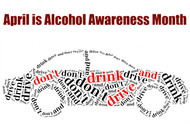Alcohol Awareness Month
Posted by Daniel Whittler on 18th Apr 2019
Signs Of Alcohol Abuse
April is Alcohol Awareness month, this makes it a good time to address to large alcohol problem we have in this country. There latest news covers much of the heroin/overdose epidemic, and rightfully so, There are 15 million alcoholics estimated to be in America, it is also estimated that less than 8% seek out treatment, very staggering numbers. I want to review some signs of a drinking problem that you can look out for if you are worried about a loved one or close friend. The last thing anyone wants is to be concerned about somebody and then have something tragic happen to them, leaving you in regret that you had not tried to do anything about it.
Going Beyond The Limit
Perhaps the most obvious sign of a drinking problem is someone who constantly gets too drunk and either becomes belligerent or blacks out. There is usually a cycle for people with this issue where they will promise to themselves and others that night that they will not drink past a certain limit. Flash forward to later in the night and they have drank double of what they told themselves they will drink. This is the most clear and obvious sign of someone with a drinking problem, especially if it happens every time they drink.
Change In Overall Mood
Alcohol is a depressant , many people equate it with partying and a good time but too much of it can really make an individual disillusioned, emotional and very sad or angry. If somebody is drinking daily, there will definitely be a noticeable mood change. Whether they may seem more depressed than usual or more combative, it really varies between each person. One thing is for sure though, a daily drinker does not have a genuinely happy vibe about them. Alcohol can really imbalance the chemicals in your brain and cause someone to be different than they ever were before.
Social Life Revolves Around Alcohol
Once a person is drinking enough, they pretty much equate alcohol with anything social. The thought of having sober fun not only seems boring to them, it seems impossible. Think about the days or nights you go out with whomever you may be concerned with, do they always suggest going to an environment that will have alcohol available? If it is something that absolutely does not include alcohol, do they back out of the plans? If you are unsure, perhaps try suggesting some type of outdoor activity or just something that definitely doesn't involve alcohol, see how they react.
There are many more things I can add to this list but these are the basic and very obvious signs. If you know somebody with a drinking problem, make a plan to confront them about it in a loving and caring way. Make it clear that there is no judgement and that you are only voicing your concern about them. Confrontation does not always go well but at least you can plant the seed in their mind that you are there to help when they are finally ready to face their problem head-on. It was not easy for me to go to treatment but once I did, after a few weeks I was able to reflect on my recent past and when I looked at it sober I really wanted to do something about it, I owe it to my family for practically forcing me to go even though I didn’t want to. Once I got there I got involved with my facilities alumni program and was able to meet a new sober crowd that showed me the path to freedom. Getting sober is the greatest thing that anybody with a drinking problem can do for themselves.


